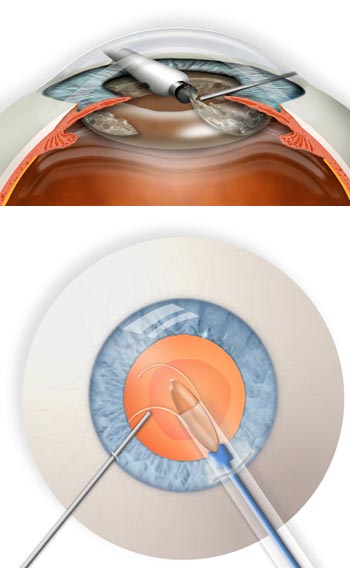Cataract Surgery

About Cataract Surgery
Modern Cataract Surgery is safe, effective and quite common. In fact, in the United States, more than 2.5 million people have cataract surgery each year making it one of the most frequently performed as well as one of the most successful surgical procedures in the United States.
Dr. Whitaker of Riverside Eye Center, has been performing cataract surgery in Maine for over 5 years and is regarded as a highly experienced cataract surgeon with a great deal of expertise using the “no stitch, no injection, no patch” technique which he performs on an outpatient basis. Dr. Whitaker treats most cataract patients and others needing eye surgery in Maine at Stephens Memorial Hospital which provides an advanced, convenient, friendly, and cost effective setting.
About the Cataract Surgery Procedure
Cataract surgery today is quite comfortable. When you arrive at the Stephens Memorial surgery center there will be a number of staff members present to assist you and make your experience pleasant. The entire process usually only requires a few hours of your time from beginning to end.
The Cataract surgery procedure will begin with drops being placed in your eye to dilate your pupil. Your eye will then be treated with an anesthetic so that you will feel little if anything during your surgery and minimal if any discomfort. For most cataract surgery patients this involves having a few sets of eye drops placed in your eyes.
Next, Dr. Whitaker will place a very small incision at the outermost edge of your cornea. This incision will be just large enough to allow a microscopic instrument the size of a pen tip to pass through it. This microscopic instrument is a sophisticated and precise instrument that helps Dr. Whitaker remove your cataract.
Then, Dr. Whitaker will gently pass the microscopic instrument through the tiny incision. Sound waves or “Ultrasound” produced at the tip of the instrument will be used to gently break the cataract into pieces small enough to be washed away, drawn through the instrument and removed from your eye. This cataract removal technique is called “phacoemulsification” and is the preferred technique of cataract surgery for most patients.
After the cataract has been removed, Dr. Whitaker will be able to insert a new, crystal clear permanent Intraocular Lens Implant (IOL) into your eye. The replacement lens will actually be inserted and placed in the correct position through the same tiny incision at the outer edge of the cornea through which Dr. Whitaker removed your cataract.
Upon completion of your cataract and lens implant surgery, Dr. Whitaker will have one of the surgery center staff members take you to a comfortable place where you will be able to rest and relax prior to going home. After resting for a short while, a surgery staff member will give you permission to have a family member or friend drive you home.
Dr. Whitaker will arrange to see you at Riverside Eye Center, in the Ripley Building adjacent to Stephens Memorial Hospital, within 24 hours of your surgery so that he can examine you in order to confirm that you are healing and seeing as planned. Dr. Whitaker will also prescribe some eye drops for you to use and ask you to wear a protective shield, mainly at night, to remind you not to accidentally rub your eye. Although each patient will heal a little bit differently, the majority of patients having cataract surgery with Dr. Whitaker are able to see well enough to return to their routine daily activities within a day or so after their surgery.
If you, a family member or friend are experiencing any of the symptoms of cataracts such as blurred vision, fading of colors, glare, haloes or difficulty with night driving, please feel free to call Riverside Eye Center in Norway, Maine at 207-743-0027or Riverside Eye Center in Lewiston, Maine at 207-786-2500 to schedule a Cataract Consultation with Martin Whitaker, M.D.
